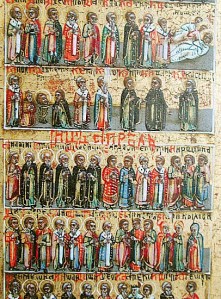|
|
 |
<< The Fifth through the Sixth Century >> >>

Important Events within Christendom from the Fifth up to the end of the Eighth Century.
Important events highlighted in blue.
- 400: Jerome's Vulgate Latin Bible translation is published. This remained the standard text in the Catholic world until the Renaissance, was used in Catholic services until the late 20th century, and remains an influence on modern vernacular translations.
- August 24, 410: Sack of Rome. Alaric and his Visigoths burst in by the Porta Salaria on the northeast of the city Rome.
- 431: The Ecumenical Council of Ephesus declares that Jesus existed both as Man and God simultaneously, clarifying his status in the Holy Trinity. The meaning of the Nicene Creed is also declared a permanent holy text of the church.
- October 8, 451: Ecumenical Council of Chalcedon opens.
- November 1, 451: The Council of Chalcedon, the fourth ecumenical council, closes. The Chalcedonian Creed is issued, which re-asserts Jesus as True God and True Man and the dogma of the Virgin Mary as the Mother of God. The council excommunicates Eutyches, leading to the schism with Oriental Orthodoxy.
- 452: Pope Leo I (the Great) meets Attila the Hun and dissuades him from sacking Rome.
- 455: Sack of Rome by the Vandals. The spoils of the Temple of Jerusalem previously taken by Titus are allegedly among the treasures taken to Carthage.
- September 4, 476: Emperor Romulus Augustus is deposed in Rome, marked by many as the fall of the Western Roman Empire. The focus of the early Church switches to expanding in the Eastern Roman Empire, also known as the Byzantine Empire, with its capital at Constantinople.
- 480: Traditional birth of St Benedict, author of a Monastic Rule, setting out regulations for the establishment of monasteries.
- 502: Pope Symmachus ruled that laymen should no longer vote for the popes and that only higher clergy should be considered eligible.
- 529: The Codex Justinianus (Code of Justinian) completed. First part of Corpus Iuris Civilis (Body of Civil Law).
- January 2, 533: Mercurius becomes Pope John II. He becomes the first pope to take a regnal name. John II obtains valuable gifts as well as a profession of orthodox faith from the Byzantine emperor Justinian.
- 533: The Digest, or Pandects, was issued; second part of Corpus Iuris Civilis (Body of Civil Law). The Institutes, third part of Corpus Iuris Civilis (Body of Civil Law) comes into force of law.
- 536: Belisarius recaptures Rome.
- 553: Second Ecumenical Council of Constantinople condemned the errors of Origen of Alexandria, the Three Chapters, and confirmed the first four general councils.
- 590: Pope Gregory the Great. Reforms ecclesiastical structure and administration. Establishes Gregorian Chant. Was also elected. (To be Pope)
- 596: Saint Augustine of Canterbury sent by Pope Gregory to evangelize the pagan English.
- 600: Islam was started by Mohammed around 600 A.D. in what is now Saudi Arabia, over 550 years after Jesus founded His Church on St. Peter and told him "the gates of Hell would not prevail against His Church". Islam is divided into many different sects such as, the Sunni, Shiah, Wahhabis, and Ismaili Khoja.
- 638: Christian Jerusalem and Syria conquered by Muslims.
- 642: Egypt falls to the Muslims, followed by the rest of North Africa.
- 664: The Synod of Whitby unites the Celtic Church in England with the Catholic Church.
- 680: Third Ecumenical Council of Constantinople puts an end to Monothelitism.
- 685: The Maradites used their power and importance to choose John Maron, one of their own, as Patriarch of Antioch and all the East. John received the approval of Pope Sergius I, and became the first Maronite Patriarch.
- 711: Muslim armies invade Spain.
- 718: Saint Boniface, an Englishman, given commission by Pope Gregory II to evangelise the Germans.
- 726: Iconoclasm begins in the eastern Empire. The destruction of images persists until 843.
- 732: Muslim advance into Western Europe halted by Charles Martel at Poitiers, France.
- 751: Lombards abolish the Exarchate of Ravenna effectively ending last vestiges of Byzantine rule in central Italy and Rome.
- 756: Popes granted independent rule of Rome by King Pepin the Short of the Franks, in the Donation of Pepin. Birth of the Papal States.
- 787: Second Ecumenical Council of Nicaea resolved Iconoclasm.
- 787: This year is considered by scholars to be the end of the Patristic Age or Age of the Early Church Father, with the death of St. John Damascene also known as St John of Damascus.
Go back to the previous time period.  Continue to the next time period. Continue to the next time period.
|
